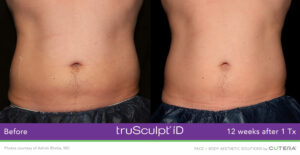Stimulating the Vagus Nerve to Block Hunger Signals
Among the cranial nerves, the vagus is the longest, travelling through the lungs, heart and esophagus to connect the abdomen to the brain. It is part of the involuntary nervous system, regulating unconscious processes like digestion and heart rate. As one of its essential functions, the vagus nerve communicates hunger signals from your digestive system to your brain.
EnteroMedics vBloc therapy is designed to intervene into this normally unconscious body process using the Maestro® System—a pacemaker-like electronic device that targets these nerve impulses that signal the brain when you are hungry. The electromagnetic pulse of vBloc therapy blocks the hunger signals, which results in feelings of satiety and decreases hunger experienced between meals. Unlike traditional bariatric surgeries that seek to decrease stomach volume or caloric assimilation, trained vBloc surgeons can use minimally-invasive vBloc surgery to implant the device laparoscopically. The procedure is completely reversible, safe and FDA-approved.
To schedule a consultation with a vBloc surgeon in that is an expert in vBloc therapy, call (832) 532-0050 or contact us online.
Candidates for vBloc Weight Loss Therapy
Among the various bariatric surgeries, vBloc therapy has been shown to be safe and effective. However, not everyone is a candidate for vBloc surgery. Potential candidates must:
- Be at least 18 years of age
- Have documentation of multiple unsuccessful weight loss attempts within the previous five years
- Have a Body Mass Index (BMI) within the 40-45 range, or a BMI within the 35-39.9 range with a secondary condition such as:
- Sleep apnea
- High blood pressure
- High cholesterol
- Type 2 diabetes
Candidates who should not consider vBloc weight loss therapy include patients who already have an electronic medical device implanted or are at high risk for surgical complications. Those who require MRIs or diathermy, or who have been diagnosed with cirrhosis of the liver, hiatal hernias, portal hypertension or esophageal varices are generally not approved for the procedure.
vBloc Surgery and Recovery
The EnteroMedics vBloc surgery is minimally-invasive and can be performed laparoscopically, causing fewer complications than other bariatric surgeries. Many vBloc surgeons perform the vBloc surgery on an outpatient basis. Your vBloc surgeon should be a trained bariatric surgeon.
During vBloc surgery, you will be placed under general anesthesia for 60-90 minutes to laparoscopically implant the pacemaker-like vBloc electromagnetic device. The device is inserted just under the skin near your ribcage. Only 3-5 small incisions are made on your abdomen and scarring is minimal. The vBloc device has several electrical leads which are placed around the vagus nerve directly above the stomach.
After vBloc surgery, you will likely be discharged on the same day. Your recovery time should be no more than a few days, and most people return to work the same week. Your vBloc surgery is not only safer and less invasive than most weight loss surgeries, but it is also completely reversible. The device can be shut off for any reason—like pregnancy—and reset when needed again, or it can be permanently removed at any point.
Risks and Side Effects Associated with vBloc Therapy Surgery
vBloc therapy for weight loss has been found to be the safest implanted medical device for weight loss to date. The most common side effects reported during clinical trials included pain, abdominal cramping, nausea, burping, difficulty swallowing and heartburn.
In clinical trials of vBloc therapy surgery, there was a Serious Adverse Event rate of 3.7 percent, notably lower than other weight loss therapy methods have reported. Serious side effects that were reported in clinical trials for vBloc surgery included:
- Partial lung collapse
- Gallbladder complications
- Neuroregulator malfunction
- Pain at the neuroregulator site
vBloc Therapy for Weight Loss Success Rates
Not only can vBloc therapy help patients to control appetite and lose weight, but it also has been shown to have positive effects on obesity-related secondary conditions such as high blood pressure, high cholesterol and high glucose levels. vBloc therapy, in clinical trials, was found to be so effective that in a twelve-month period, patients implanted with the Maestro® System for vBloc therapy experienced a 28 percent decrease in excessive weight.
Schedule a consultation with a qualified vBloc surgeon in that specializes in vBloc surgery. Call (832) 532-0050 or contact us online.

